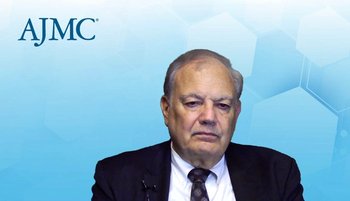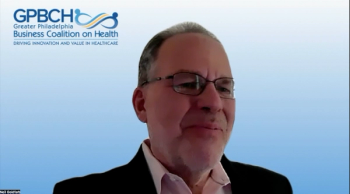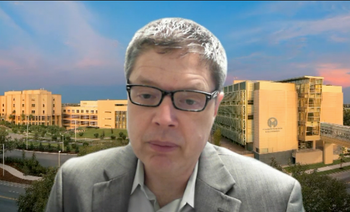
Dennis Slamon, MD, PhD, lead investigator on the NATALEE trial of ribociclib plus hormonal therapy in hormone receptor–positive, HER2-negative early-stage breast cancer, discussed the study's broad population and potential payer reactions.

Rose is an editorial director at The American Journal of Managed Care® (AJMC®).
She has a BA in journalism & media studies and Spanish from Rutgers University. You can connect with Rose on LinkedIn.

Dennis Slamon, MD, PhD, lead investigator on the NATALEE trial of ribociclib plus hormonal therapy in hormone receptor–positive, HER2-negative early-stage breast cancer, discussed the study's broad population and potential payer reactions.

Jeffrey E. Lancet, MD, chair of the Department of Malignant Hematology at Moffitt Cancer Center in Tampa, Florida, gave his insight on the treatment of acute myeloid leukemia (AML) across patient groups.

Mark A. Socinski, MD, executive director at AdventHealth Cancer Institute, shares insight on the cost-effectiveness and utility of biomarker testing in non–small cell lung cancer (NSCLC).

A range of posters presented at the 2023 American Thoracic Society (ATS) International Conference highlighted a plethora of risk factors for pulmonary conditions in adulthood outside of tobacco smoking history.

A symposium at the 2023 American Thoracic Society International Conference highlighted common comorbidities that warrant consideration in patients who present with chronic obstructive pulmonary disease (COPD).

A symposium at the 2023 American Thoracic Society (ATS) International Conference featured research on predictors of chronic obstructive pulmonary disease (COPD) occurrence and disease progression.

Posters presented at the 2023 American Thoracic Society International Conference called for improvements in care for chronic obstructive pulmonary disease (COPD) and pulmonary hypertension.

Quantifying social determinants of health and addressing the factors that allow disparities to persist will require standardized measurements and targeted interventions, said a panel of experts at the 2023 American Thoracic Society International Conference.

Mark A. Socinski, MD, executive director of the AdventHealth Cancer Institute, shared his thoughts on the most important recent advances in non–small cell lung cancer (NSCLC), including a better understanding of patients who may benefit from immunotherapy.

In the phase 3 BOREAS study of patients with chronic obstructive pulmonary disease (COPD) and type 2 inflammation, patients treated with dupilumab experienced fewer COPD exacerbations, improved lung function, and improved quality of life compared with patients given a placebo.

Neil Goldfarb, president and chief executive officer of the Greater Philadelphia Business Coalition on Health (GPBCH), gives a preview of what attendees can expect at the 2023 GPBCH Annual Conference.

In the phase 3 SINUS-24 and SINUS-52 trials, dupilumab improved clinical outcomes and and health-related quality of life among patients with chronic rhinosinusitis with nasal polyps (CRSwNP) and clinical features of obstructive lung disease.

A recent study suggests that monitoring anxiety and distress levels during watch-and-wait disease management time frames may improve the patient experience.

Osimertinib plus chemotherapy showed a statistically significant improvement in progression-free survival (PFS) vs osimertinib alone in patients with epidermal growth factor receptor–mutated (EGFRm) advanced non–small cell lung cancer (NSCLC)

This year’s American Thoracic Society (ATS) International Conference will spotlight not only the latest research in respiratory medicine, but also timely themes such as minority health equity, the effects of climate on health, and reducing gun violence through advocacy.

Despite similar health care utilization, White patients were much more likely to receive and fill prescriptions for medications to treat opioid use disorder (OUD) compared with Black or Hispanic patients in the months following a high-risk OUD event such as an overdose, a new study has found.

Mailing at-home human papillomavirus (HPV) self-collection tests and providing booking assistance for in-clinic screening visits nearly doubled the rate of cervical cancer screenings among underscreened women from low-income backgrounds vs offering scheduling assistance alone.

Treatment with dupilumab demonstrated improvements in histological markers, symptoms, and endoscopic markers of eosinophilic esophagitis (EoE) regardless of previous history of esophageal dilation.

An analysis of the EMPOWER‐Lung 3 trial found that the addition of cemiplimab to platinum chemotherapy for non–small cell lung cancer (NSCLC) was associated with improved patient quality of life (QOL) vs chemotherapy alone.

Jeffrey E. Lancet, MD, chair of the Department of Malignant Hematology at Moffitt Cancer Center, discussed the issue of cost and optimizing patient outcomes acute myeloid leukemia (AML).

The presence of certain comorbidities prior to androgen deprivation therapy (ADT) for prostate cancer may be associated with a greater risk of cardiovascular events after starting ADT, recent research found.

A recent study found that patients with advanced solid cancers with high tumor mutational burden (TMB) saw improved outcomes on immune checkpoint inhibitors (ICIs) compared with patients who had low-TMB cancers.

Jeffrey E. Lancet, MD, chair of the Department of Malignant Hematology at Moffitt Cancer Center, gave insight on the evolving treatment landscape of acute myeloid leukemia (AML) and the potential of immunotherapy and targeted therapies going forward.

Mark A. Socinski, MD, executive director of AdventHealth Cancer Institute, gave insight into treatment resistance and the importance of repeat biomarker testing at the time of disease progression in non–small cell lung cancer (NSCLC).

A cross-sectional survey of patient preferences found that the out-of-pocket cost of treatment was the most impactful attribute for patients when choosing an androgen deprivation therapy (ADTs) for their prostate cancer.

Mark A. Socinski, MD, executive director of the AdventHealth Cancer Institute, shares his insight on liquid- and tissue-based biopsies and their clinical utility in non–small cell lung cancer (NSCLC).

Craig D. Pederson, principal at Insight Health Care Partners, discussed the evolving landscape of value-based care and challenges to implementation from the provider perspective during his keynote presentation at the National Association of Managed Care Physicians (NAMCP) Spring Managed Care Forum 2023.

A session led by Irina Koyfman, DNP, NP-C, RN, at the National Association of Managed Care Physicians (NAMCP) Spring Managed Care Forum 2023 detailed the potential of chronic care management billing for physicians who are not currently doing it and recommendations for optimizing the process.

Todd A. Zigrang, MBA, MHA, FACHE, CVA, ASA, ABV, president of Health Capital Consultants, discusses accountable care organizations (ACOs) and the move toward value-based care models.

Mark A. Socinski, MD, executive director of the AdventHealth Cancer Institute, discusses the importance of biomarker testing in non–small cell lung cancer (NSCLC).

259 Prospect Plains Rd, Bldg H
Cranbury, NJ 08512
© 2025 MJH Life Sciences®
All rights reserved.
